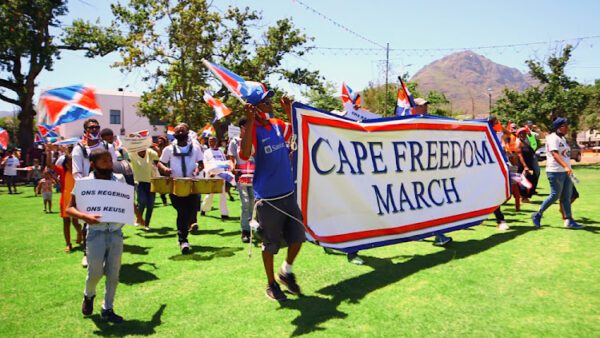What Cape Independence Could Mean for Us
Gregory Hood, American Renaissance, January 11, 2024
Subscribe to future audio versions of AmRen articles here.
A few years ago, after violent riots in South Africa killed more than 70 people, Revolver christened the country the first to be built on Critical Race Theory. It could also be the first to be broken up by CRT. Even hardly far-right Der Spiegel argued in 2023 that South Africa “now finds itself, following decades of economic malpractice and political incompetence, on the brink of the abyss.” Riots, mountains of trash, crime, breakdown of infrastructure, and even the inability to keep the lights on now blight what was once a civilized country. History has redeemed the defenders of white South Africa, but the falling white population and the failure to keep control of key institutions such as the army probably mean the country can’t be wholly reclaimed.
Orania, a small Afrikaner settlement, is a beacon of hope and a model for whites everywhere, but it is just one town, reliant on constitutional protections that the African National Congress could take away at any time. Another possible model is the movement for Cape Independence.
The Western Cape province is unusual for South Africa. It has no racial majority, with a plurality of Coloured people, slightly fewer blacks, and a sizable white minority. The opposition Democratic Alliance (DA) has governed it since 2009, making it a political outlier as well. The former Cape Colony also has a distinct history; it had all-race voting at a time when the other provinces were under exclusive white control. Paradoxically, that may be why the Cape is now to the right of the rest of South Africa. While the black majority elsewhere sees the current regime as an explicit repudiation of white South Africa, activists in the Cape can plausibly claim that in an area with no racial majority, non-racial politics is the only path forward.
The Cape Independence Party, a single-issue party, has two members on the 231-seat Cape Town city council. Western Cape premier Alan Winde blasts the party as ineffective, but its nickname, CAPEXIT, reminds us that what was thought a “fringe” party managed to persuade Britain to leave the EU.
Polls also suggest Cape Independence is popular, especially since the COVID-19 outbreak in 2020. The latest poll shows over 68 percent of voters support a referendum on independence, and almost 60 percent would vote for it outright. Most whites and Coloureds think independence would improve their lives, with Coloureds even more optimistic than whites. Fewer than 40 percent of blacks agree.

Supporters of Cape Independence at a march. Credit: Suffy69, CC BY-SA 4.0, via Wikimedia Commons
Although more than 60 percent of whites want independence for the province, even more Coloureds want independence. Almost 60 percent of blacks want to stay in the republic. A plurality of both Coloureds and whites think South Africa will get worse in the next 25 years; a plurality only of blacks think things will get better.
The Economic Freedom Fighters of Julius Malema, not surprisingly, is the party with the greatest hostility to independence, with more than 77 percent of members opposed. Despite the DA leadership’s scorn for independence, most party members support it.
Here is Mr. Malema:
Julius Malema puts Cape Independence movement to shame.
EFF 2024 ✊🏿 pic.twitter.com/xNAM7WSqrT
— No to Capexit! 🇿🇦🇵🇸 (@remainza) January 6, 2024
The DA is hoping to win this year’s national elections, but faces long odds. Many blacks think it is the “white” party and will not vote for it no matter how corrupt and incompetent the ANC is. It’s like waiting for Chicago or East St. Louis blacks to vote GOP to fight crime. The EFF is likely to do well this year.
That may improve the chances for Cape Independence. The Cape is demographically and historically different from the rest of South Africa, but the chief difference is ideological. The rest of South Africa is essentially a black revenge project, confiscating and running down what’s left of the white regime. The Cape could survive and even thrive on its own even while an ANC-EFF government wrecked the rest of the country. Billionaire Rob Hersov has said that if the ANC stays in power, the Cape must break free.
BREAKING NEWS:ALLEGEDLY
CAPE INDEPENDENCE!!!!
ROB HERSOV!!!
“IF THE ANC REMAINS IN POWER ALONE NEXT YEAR AND DOESN’T GOVERN WITH THE DA…. WE WILL FOCUSS ALL OUR RESOURCES ON “BUYING” THE WESTERN CAPE!!! 🤔 pic.twitter.com/35oOyGP0y3
— @BREAKING NEWS-ALLEGEDLY (@DKNMOHAMMED) December 13, 2023
Obviously, an independent Cape would not be a white nation, let alone an ethnostate. An Orania-like Afrikaner Volkstaat is the goal, but an independent Cape sets a disruptive precedent, and would give the world a country that might have Afrikaans as its main language.
It would represent an escape from a political system that seems dedicated to extracting wealth from whites. The Cape may never vote ANC, but it seems doomed to be forever governed by it if it stays in the republic. If that is “democracy,” it’s also a prison. While opponents of Cape Independence charge that whites want to run the province as a “colony,” wealth would stay within the province.
“Who depends on whom?” is always the central question about race. South Africa needs the Cape, but the Cape doesn’t need South Africa. If it can break away, it will be a model for us. If South Africa is our future, let there be a silver lining.















